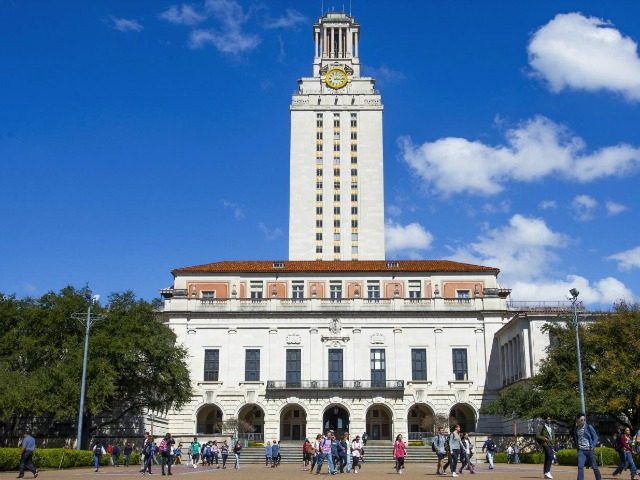The University of Texas at Austin rolled out a new “hate and bias” incident policy that plans to protect all of its students, faculty, staff, and others on campus from becoming targets of “prohibited” conduct.
Called the Hate and Bias Incident Policy, it forbids “unlawful harassment on the basis of race, color, religion, national origin, gender, gender identity or gender expression, age, disability, citizenship, veteran status, sexual orientation, ideology, political views, and political affiliation.” It also includes some derogatory graffiti and vandalism. Based on the severity of an infraction, a student who violates the policy may be subject to suspension or expulsion. Faculty may be disciplined or terminated.
On Wednesday, UT-Austin President Greg Fenves sent a letter to students and faculty announcing actions conducted with “discriminatory and hateful intent” on campus will be punished swiftly and with greater consequences, according to KEYE. He stated the policy “clearly defines” three primary actions that can result in a hate or bias incident charge: threatened or actual violent conduct, harassment, and incitement to imminent violations of the law. In turn, the the University may probe alleged claims through prompt, fair, and impartial investigations.
The immediate implementation of this policy followed a town hall-style campus meeting Fenves held in February, largely prompted by students who criticized university officials for their lukewarm response to discrimination and hate incident complaints, including recent situations involving anti-Semitic and anti-Muslim posters found on campus.
However, UT-Austin Communications Manager with the Office of the Dean of Students Sara Kennedy told Breitbart Texas the “hate and bias” policy was in development for about 10 months and was not triggered by any recent current events. She described the new rules as “a policy for all of our students, for all of their beliefs, for all of their identities and statuses.”
The operating procedures handbook states UT-Austin “embraces and encourages diversity and strives to create an inclusive community that fosters an open and supportive learning, teaching and working environment.” The university supports a free exchange of ideas “alongside thoughtful consideration of our differences.”
The policy addresses “potentially offensive” speech, ideas and actions, stating “the principles of free inquiry and expression” protect an individual’s use of controversial ideas, opinions, and differing viewpoints, but no one can threaten, harass, or become violent against another person.
The policy does not provide “specific examples” because “there are so many different possibilities,” said Kennedy. She clarified it “defines hate, not who’s protected” and “what behaviors the university is not going to accept.”
Last October, the Young Conservatives of Texas (YCT-UT) campus chapter held a “bake sale” to protest affirmative action policies. On Facebook, the group clearly explained their intention in pricing goods by gender and ethnicity to “illustrate this disastrous policy that demeans minorities on our campus by placing labels of race and gender on their accomplishments.”
UT-Austin student government responded to the bake sale by calling for the conservative group’s disbandment and for a campus “hate speech” policy. University administrators initially condemned the bake sale as “inflammatory and demeaning,” although later took no action against the group for exercising their constitutional right to free speech. School officials also took no action when UT students protested campus carry armed with sex toys.
This policy replaces the Student Policy on Race Relations, which only protected individuals based on race, noted Kennedy. “The university is a place where students come to learn, to explore these big ideas about their personal identities of who they are and how they want to represent themselves. This is the place they get to do that. It definitely means they don’t always agree,” she continued.
According to the policy, anyone can report an alleged hate or bias incident to the Dean of Students, the Office for Inclusion and Equity, the Campus Climate Response Team, or any UT-Austin official. These reports will be tracked and recorded by the Campus Climate Response Team.
Follow Merrill Hope, a member of the original Breitbart Texas team, on Twitter.

COMMENTS
Please let us know if you're having issues with commenting.